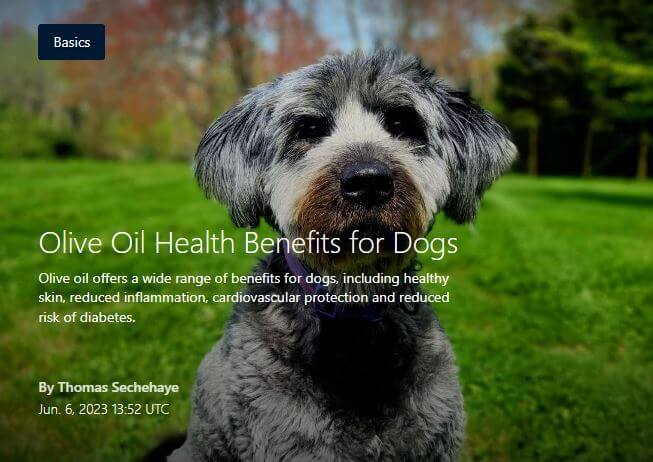Health Benefits of Olive Oil for Dogs

The Mediterranean diet not only benefits human health, but also offers a wide range of advantages for dogs.
Olive oil is the primary source of fat in the Mediterranean diet, which is associated with benefits for cardiovascular health. It’s no surprise that pet owners want to share the extraordinary health benefits of olive oil with their dogs.
“With the numerous health benefits of olive oil for the human diet, you may have wondered, ‘is olive oil good for dogs, too?” Kym Hough, marketing manager for Californian producer McEvoy Ranch, told Olive Oil Times. “The resounding answer is yes, olive oil offers many benefits for dogs.”
“Olive oil contains phytonutrients, vitamin E and omega-3 fatty acids that help keep the dog’s skin moisturized and well-nourished for a healthy and beautiful coat,” she added. “Olive oil is also rich in antioxidants, which have been shown to fight free radical damage and effectively boost the immune system.”
According to Rover, a pet care services platform, olive oil helps your dog’s health in four ways: skin, weight, taste and immune system.
Recent studies confirm that extra virgin olive oil prevents skin dryness, soothes flaky skin, supports heart health and reduces inflammation. For older dogs, these can be life-changing benefits to help dogs stay agile, flexible and active.
The benefits of extra virgin olive oil also include its ability to support healthy skin, relieve itching associated with allergies and reduce inflammation.
Christopher Reeder, a board-certified dermatologist at BluePearl Veterinary Partners in Franklin, Tennessee, told Chewy that shine and luster in dogs’ coats can be observed after about 30 days of dietary olive oil supplementation.
But experts warn that while it may be tempting to apply olive oil directly to the skin, dogs tend to lick it off. Instead of getting into a sticky mess, they suggest adding a teaspoon of olive oil to their food.
Small amounts of olive oil can be added to dog food to help maintain ideal body weight. But vets warn against giving olive oil to dogs with intestinal disorders such as diarrhea or vomiting.
According to Spanish Olive Oil Interprofessional, a non-profit organization, olive oil helps prevent heart disease and reduce the risk of diabetes in dogs. Olive oil consumption also increases dogs’ energy and helps prevent cellular oxidation.
Olive oil can boost the immune system and help prevent or delay cognitive decline. Important antioxidants such as Vitamin E protect cell membranes from free radical damage. Dogster magazine notes that olive oil is especially beneficial for older dogs and can help keep their minds sharp.
The Chewy report recommends extra virgin olive oil for its low acidity and rich nutrient content. However, Judy Morgan, a holistic veterinarian and report author, recommends no more than one teaspoon of olive oil per 20 pounds (9 kilograms) of body weight per meal.
According to Spanish Olive Oil Interprofessional, a tablespoon of olive oil once or twice a week is the typical amount to add to your dog’s food.
Some veterinarians recommend one teaspoon for every 30 to 40 pounds (13.5 to 18 kilograms). Recommendations also vary if your dog has unique ailments, conditions or diseases.
Many dog food brands have started to add healthy fats such as olive oil directly into their products.
According to Rover, olive oil can make your dog’s food palatable. A little olive oil can help make dry or stale food more appealing. Hough echoes this benefit, saying: “Olive oil improves the flavor of dog food, and as great dog lovers, having a happy puppy is the best gift of all.”
According to the Innovative Veterinary Care Journal (IVC Journal), extra virgin or unprocessed olive oil offers healthy dietary fat and protects the cardiovascular system. This oil, which is higher in nutritional value, is preferred over non-virgin olive oils due to the extraction method. The IVC Journal stated that extra virgin olive oil is safe for dogs to consume, even over long periods of time.
In Pets Magazine, Therese Tan shares a few guidelines for using extra virgin olive oil in regular dog food. Tan recommends using extra virgin olive oil for a fresher flavor and lower acid content. However, it is important to consider the impact on their weight. Olive oil contains fat and calories that may need to be monitored to prevent weight gain.
According to Tan, olive oil can irritate dogs with sensitive stomachs. Therefore, if a dog reacts with an upset stomach, it is advisable not to give them more. Similarly, in case of vomiting or diarrhea, olive oil can worsen the situation.
Moderation is very important for the use of olive oil in dog grooming. Morgan recommends paying attention to portion control, as extra calories can cause weight gain. Also, experts recommend talking to a veterinarian before adjusting a dog’s diet.
Source:
